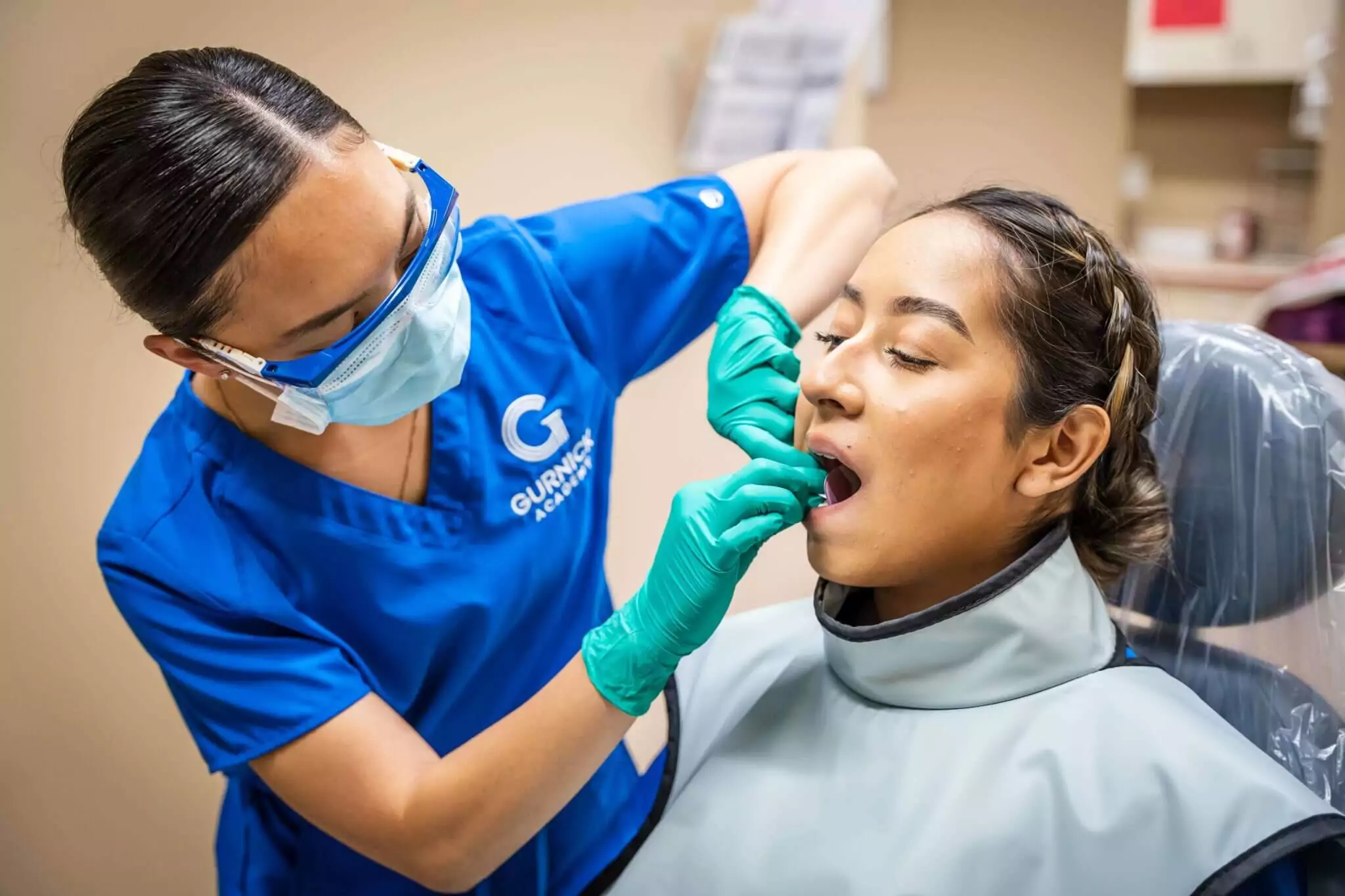Table of contents
Get Started with Kwikly
Get the latest updates, insights, and exclusive content delivered straight to your inbox.
What You Need to Know
Dental hygiene programs typically require 60 to 80 credit hours and include coursework in dental sciences, psychology, and sociology. Many schools offer flexible scheduling with part-time, full-time, or variable hours, making it easier to balance education with other responsibilities. Nursing programs, on the other hand, are often considered more academically rigorous because they cover a broader range of material, while dental hygiene programs focus more on hands-on clinical skills and direct patient care. Choosing dental hygiene also comes with strong job prospects, as demand for dental hygienists is projected to grow by 9% over the next decade. With a median salary of about $94,260, hygienists enjoy competitive pay and often earn high wages early in their careers. For those interested in further advancement, additional education can open doors to leadership, teaching, or specialized roles.
What Each Program Actually Requires

Both nursing and dental hygiene involve patient care, but their responsibilities, educational paths, and work environments are totally different. If you’re trying to decide between dental hygiene and nursing, it really comes down to what kind of patient interaction gets you excited and how much direct medical involvement you want in your day-to-day work. Dental hygienists often build relationships with their patients, which enhances trust and ongoing care. In both fields, strong relationships with patients can improve the quality of care and increase job satisfaction. People who enjoy working with others and value hands-on interaction may find either path especially rewarding.
Educational Prerequisites
When you’re looking at dental hygiene education, you’ll dive into classes covering dental anatomy, preventive counseling, and basic sciences like general chemistry and anatomy. You’ll also take psychology and sociology courses. Many dental hygiene programs are offered at the college level, providing hands-on training and preparation for a healthcare career. Most dental hygiene programs need you to complete 60 to 80 credit hours, and here’s the good news: many offer online or evening classes so you can keep working while you study.
Degree Programs
If you’re pursuing a career in dental hygiene, there are several degree options available:
- Associate degree – the minimum requirement to begin working as a dental hygienist.
- Bachelor’s degree – provides additional opportunities for advancement and specialized roles.
- Master’s degree – opens doors to leadership, teaching, and research positions within the field.
Advanced degrees in dental hygiene or related fields can open doors to research, teaching, or specialized roles, providing further opportunities for professional growth. There are also fully online bachelor’s degree programs in dental hygiene available, offering the flexibility to continue working while advancing your education.
Licensure Exams
To become a licensed dental hygienist, you must complete several important steps. First, you’ll need to pass the National Board Dental Hygiene Examination (NBDHE), which evaluates your knowledge of biomedical and dental hygiene sciences and is required for licensure in every state. Next, you must successfully complete a state or regional clinical examination to demonstrate your practical skills. Most states also require background checks as part of the licensing process. It’s important to note that clinical exam formats and requirements vary widely from state to state, so you’ll need to review the specific guidelines for the area where you plan to practice.
Curriculum and Coursework Intensity
Both dental hygiene and nursing programs require you to tackle comprehensive coursework, including various sciences and patient care training, and both fields require students to learn how to develop and implement care plans tailored to individual patient needs.
Core Subjects
In dental hygiene, your core subjects include anatomy, microbiology, dental materials, and the study of oral diseases such as gingivitis and periodontitis, while nursing programs focus more on health assessment, pharmacology, and pathophysiology. Both programs cover human anatomy, physiology, and patient care, though the focus and depth vary depending on which path you choose.
Getting a handle on these core subjects is what shapes your career path, no matter which course you’re pursuing.
Clinical Training
Clinical training is where things get real in both fields. As a dental hygiene student, you’ll get extensive clinical experience, providing direct patient care right alongside licensed professionals. These hands-on experiences help you train to become a skilled healthcare worker, interacting directly with patients and colleagues.
Nursing students also get that hands-on experience in different healthcare settings, which shows you just how important direct patient care really is. They too are preparing to be healthcare workers who engage with patients and work closely with other professionals.
Academic Rigor
Nursing programs are often considered more academically challenging because they cover a wider range of material and more complex topics. Dental hygiene, while less broad in scope, comes with its own unique demands. As a dental hygienist, you’ll need to rely on ergonomic practices, consistent self-care routines, regular exercise, and proper positioning to manage the physical demands of the job and maintain long-term health in your career.
Time Commitment and Program Duration
Dental hygiene programs take several years to complete, and you’ll need to balance your personal life with your professional responsibilities. Many professionals spend many years building expertise and advancing in their dental hygiene or nursing careers.
Program Length
Most dental hygiene programs run two to three years, with around 2,932 hours split between theory and clinical practice. The curriculum mixes theoretical classes with practical lab work, so you get a well-rounded education.
Full-Time vs. Part-Time Options
Once you're a dental hygienist, you can choose from different employment types, including:
- Full-time
- Part-time
- Temporary
- Fill-in positions. These options give you flexible work arrangements. Many dental hygiene programs also offer flexible scheduling, so both full-time and part-time students can make it work.
Balancing Work and Study
The flexible scheduling options in dental hygiene programs help you balance your studies with work responsibilities. This flexibility is key when you're trying to manage both academic and financial commitments, giving you options when you need them most.
Most students find they can work while studying, which helps them balance their academic goals with their financial needs.
Career Path and Job Outlook

If you’re thinking about dental hygiene, chances are you’ve heard it’s one of the top career choices in oral healthcare. And honestly? The people talking about it aren’t wrong. You get solid pay and the kind of flexible schedule that actually works with your life.
Dental hygiene offers strong job stability, as the demand for dental care remains consistent across different locations, ensuring dependable employment opportunities. It can be a wonderful career; dental hygienists enjoy fulfillment, respect, and the chance to make a real difference in patients’ lives.
Employment Opportunities
Here’s something that might surprise you - dental hygienist jobs are growing at 9% from 2023 to 2033. That’s way better than most other careers out there. We’re talking about 16,400 new positions opening up every year over the next decade. Some of that’s new jobs, some of that’s people retiring, but either way, there’s room for you.
You’re not stuck in just one type of workplace either. Sure, most dental hygienists work in a dental office, often alongside dental assistants and dentists as part of a team. Many hygienists choose to work in more than one dental office or on a part-time basis, giving them flexibility and variety in their schedules. You can also find work in schools, hospitals, and public health organizations if that’s more your thing.
Salary Expectations
Let’s talk money, because that’s probably what you really want to know. The average salary for dental hygienists is around $94,260 as of May 2024, which is highly competitive compared to the average salaries of other healthcare roles like registered nurses. Dental hygienists can expect a competitive salary, with competitive salaries making the field especially attractive for those seeking strong earning potential with a relatively short educational path. Salaries can vary significantly by region, so the average salary may be higher or lower depending on your location and level of experience. Overall, dental hygienists enjoy competitive salaries and strong earning potential in the healthcare industry.
Advancement Opportunities
If you want to move up in the world, you can grab a bachelor’s degree and start looking at leadership positions. Some dental hygienists choose to pursue advanced roles in dentistry, such as teaching, research, or even applying to dental school. Want to go even further? A master’s degree opens doors to leadership roles or teaching opportunities.
Here’s something a lot of people don’t realize: dental hygienists usually have a more predictable schedule than nurses. This allows for personal time and reduces the stress of not knowing when you’ll be working next.
Student Experiences and Challenges

If you’re thinking about dental hygiene, you’ve probably heard from students who say there’s something really rewarding about working with all kinds of people. Dental hygienists and nurses have a direct, positive impact on their patients' lives by providing care, building relationships, and supporting overall health. Helping patients maintain a healthy mouth is essential, as good oral health contributes significantly to their overall well-being and quality of lives.
Student Testimonials
There’s this dental hygiene student we know who’s all about hands-on work. Students who are interested in hands-on work and patient care often find dental hygiene especially rewarding. She says it’s incredibly fulfilling and loves helping patients keep their mouths healthy. It’s the kind of work that makes you feel like you’re actually making a difference.
We also talked to someone who used to be in nursing. She’ll tell you straight up that the workload is tough, but the faculty and other students really have your back when things get challenging. Both of them say the intensity pushes you to get better at managing your time and bouncing back from setbacks. It’s just part of healthcare training, whether you’re going for dental hygiene or nursing.
Common Challenges
Here's the thing - if you're in a dental hygiene program, you're going to deal with tricky patients sometimes. Kids especially can be a handful. Trying to stay focused during those long appointments when you've got a restless little one in the chair? Yeah, that's not easy.
Support Systems
Your faculty is there to help you get through the tough coursework and those clinical rotations that can feel overwhelming. And don't underestimate your classmates, as working together as a team really helps when you're all trying to figure things out and handle the pressure.
Professional organizations are worth looking into too. They've got networking opportunities, resources, and continuing education that can help you move your career forward. There are real benefits there for people in the profession.
Choosing Between Dental Hygiene and Nursing

If you’re thinking about dental hygiene or nursing, you’ll want to figure out what really clicks with you and where you’d actually want to work every day. The path to becoming a registered nurse typically involves completing a registered nursing program and passing a licensing exam, while entering dental hygiene or dental school requires meeting different prerequisites and often facing a highly competitive admissions process. Registered nursing programs generally require coursework in anatomy, physiology, and clinical practice, and becoming a registered nurse involves obtaining licensure after graduation. In comparison, dental hygiene programs and dental school have their own academic requirements and focus areas, with dental school being particularly competitive and demanding in terms of academic workload and prerequisites.
Self-Assessment
Getting real about your strengths is going to help you figure out if dental hygiene or nursing is your thing. If you’re leaning toward dental hygiene, think about whether you’re good with hands-on stuff and talking to patients. Most people tend to develop ongoing relationships with their dental hygienists, which can make the work more meaningful.
At the end of the day, taking a hard look at what you’re good at and what matters to you is going to point you toward the right healthcare career.
Long-Term Goals
Where you see yourself down the road can be pretty different between dental hygiene and nursing, and that's going to affect how happy you are with your job. Your future goals should help you decide between nursing, where you can specialize in all kinds of areas, and dental hygiene, which tends to be more focused on one thing.
If you're thinking about dental hygiene, understanding what kind of money you can make helps you line up your career choice with your financial goals.
Work-Life Balance
Both dental hygienists and nurses deal with heavy workloads, and that's going to hit your work-life balance hard. Dental hygiene programs usually ask for a lot of your time and tons of hands-on training, which means less time for yourself and fun stuff.
Flexible schedules or part-time work can help you manage school alongside other commitments while giving you job security.
Dental Hygiene vs Nursing Careers
Here's the deal: both dental hygiene and nursing give you fulfilling careers, but they come with different educational requirements, how intense the coursework is, and what opportunities you'll have. Dental hygiene programs are usually shorter and offer flexible scheduling, making it easier to juggle work and study. Nursing programs often cover more ground and might push you harder academically.
Picking between dental hygiene and nursing comes down to what you prefer, where you want to be long-term, and how you want your work-life balance to look. Dental hygienists get predictable schedules and fewer night shifts, while nurses can specialize in tons of different areas. When it comes down to it, being honest about your strengths and thinking carefully about your personal and professional goals will point you toward the right healthcare path.
Frequently Asked Questions
What are the main differences between dental hygiene and nursing school requirements?
Dental hygiene and nursing school requirements are pretty different when it comes to what you'll focus on and what core subjects you'll take. Dental hygiene is all about oral health and preventive care, while nursing covers way more healthcare topics. Each path has its own licensing exams you'll need to pass.
How long does it take to complete a dental hygiene program?
You're looking at two to three years to finish a dental hygiene program. That includes both classroom learning and clinical training to get you ready for what's coming.
What are the career advancement opportunities for dental hygienists?
Dental hygienists have solid opportunities to move up by getting more education, like a bachelor’s or master’s degree, which can open doors to leadership or teaching roles. Some dental hygienists choose to pursue further education to become a doctor, such as a dentist or physician, or work closely with doctors in clinical settings. You can also get specialized training that lets you expand what you do and take on roles like dental therapist.
What is the job outlook for dental hygienists?
The job outlook for dental hygienists looks good, with a projected growth rate of 9% from 2023 to 2033. That means about 16,400 positions will open up each year because of new opportunities and people retiring.
How do dental hygiene programs support students in balancing work and study?
Dental hygiene programs help you balance work and study by offering flexible scheduling, like online or evening classes. This lets you handle both your schoolwork and financial responsibilities without losing your mind. It makes the whole educational experience way more manageable when you're working.








